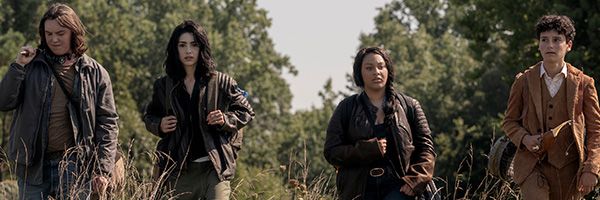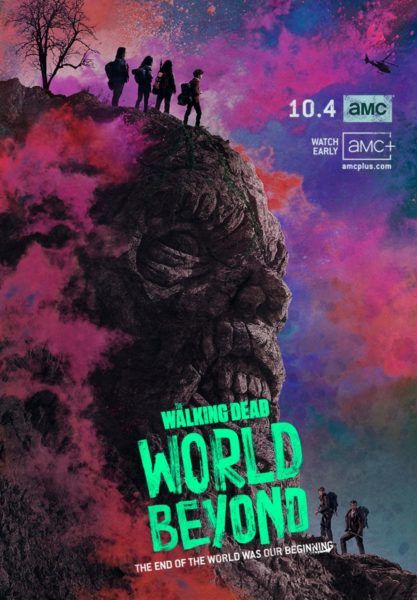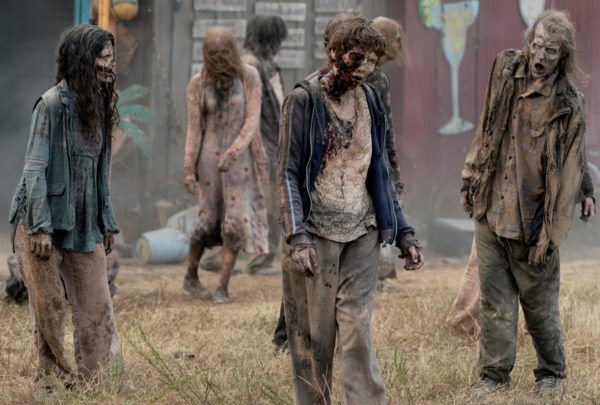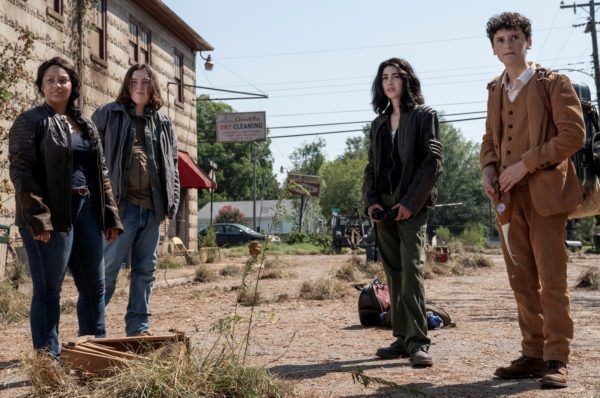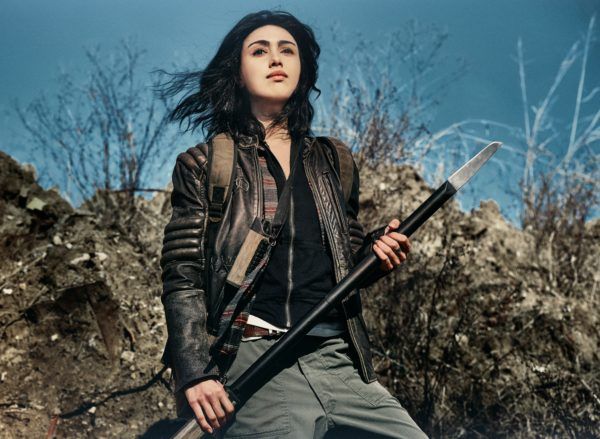Co-created by Scott M. Gimple and Matt Negrete, the AMC series The Walking Dead: World Beyond follows the first generation raised in the civilization of the post-apocalyptic world of zombies. When sisters Iris (Aliyah Royale) and Hope (Alexa Mansour) leave their life of safety and comfort behind to venture out into the unknown, with the help of fellow teenagers Silas (Hal Cumpston) and Elton (Nicolas Cantu), survival instructor Felix (Nico Tortorella) and security guard Huck (Annet Mahendru), they end up on a dangerous journey that will challenge them in every way imaginable.
During this 1-on-1 phone interview with Collider, executive producer Matt Negrete talked about his evolution from writer on Season 4 of The Walking Dead to showrunner on World Beyond, the unusual experience of writing a show that you were a fan of first, the challenges of telling a new story that’s also attached to such a substantial existing universe, having to factor all aspects of the franchise into the storytelling, how living through a real pandemic has changed his perspective on the zombie genre, and what most excites him about the storytelling in World Beyond.
Collider: You joined the original Walking Dead in Season 4 as a producer and writer. How did you end up in that position on the flagship series? What brought you in, at that point?
MATT NEGRETE: It’s funny, I had been a fan of The Walking Dead for the first three years. I had been working on a show for the USA Network, which was a very different show. It was an FBI procedural called White Collar and I was looking to change it up. I’d been on that show for three years. I talked to my agents because my contract was up there and I was just asking around, in terms of some other opportunities that maybe I could explore. And simultaneous to that, they were approaching what was gonna become Season 4 of The Walking Dead.
Scott Gimple (the chief content officer of the franchise) is someone that I actually go way back with. We went to college together, back in the day. I had written this spec script and gave it to my agents, that they then forwarded onto Scott. Scott was very funny because he didn’t want to hurt our friendship or anything. He was afraid, if my script wasn’t good, then he’d have to let me down easy, so he didn’t even tell me he was reading it. And then, he called me up and was like, “I read this great script. How would you like to work on The Walking Dead?” And I was like, “Well, duh, I would love to. I love the show.” It just went from there. I was looking to change things up and Scott is someone that I had a previous relationship. I’d written this dark script that seemed appropriate for the show, and ultimately it’s that script that helped me get this job.
What’s it like to go from being a fan of a show to then having a hand in helping shape that show and now running World Beyond? What has that transition been like for you?
NEGRETE: At first, I’ll say that it was really daunting. My first episode in Season 4 was this episode where Rick banishes Carol from the prison and the group for basically killing people, in a way that was unauthorized by the community. Here were those two O.G. characters from Season 1, and this was a pivotal story between the two of them. I was sitting down to write the dialogue for Rick and for Carol, and it felt so weird, like I was writing fan fiction. I was so hard on myself. I was like, “Would Rick say this? I don’t think Rick would say this. Does this sound like Carol? I’m not sure this sounds like Carol.” And so, for me to get past that feeling of, I’m not a fan writing fan fiction but I’m actually a writer on the show, and to get past that imposter syndrome I had was a bit of a hurdle. But Scott was great and he was really reassuring me and said, “You’re doing a great job.” It just went from there. If someone had told me that six years later, I would be running a Walking Dead show, I would have said they were crazy. It’s just something where I was like, “Well, let’s see how this goes. This is unlike anything I’ve ever done before.” Even as a fan of the show, writing something that was specifically genre and especially something in the dark sort of horror aspect of it was new for me, so there was a learning curve. It’s been a remarkable journey. Looking back, I’m just proud of what I’ve been able to do and the opportunity that’s been given to me.
What have been the most surprising challenges or opportunities that you’ve found in telling this new story that’s also attached to such a substantial existing universe and mythology?
NEGRETE: That’s a good question. The biggest challenge of this show is really creating a world that feels like it’s part of the expanded universe but still stands on its own. There are these rules that exist for this community that we’re starting to learn about, which is the Civic Republic, and we’re trying to figure out how to develop this world while getting the audience to care about this core group of characters. That was a challenge. Ten years, and now going into 11 years, on The Walking Dead and six years of Fear the Walking Dead is a lot of episodes of television and you wanna be able to do something that’s different enough that it doesn’t feel like something that has been done before. After that many episodes of television, it’s hard. So, making sure that it felt like the show fit in the universe but also felt different, finding that balance, is probably the most challenging aspect.
Do you have times that you think of a really cool idea but then realize that it would completely blow up something else that you can’t touch?
NEGRETE: Yeah, that’s happened quite a bit. That’s one of the things that Scott Gimple, the chief content officer for The Walking Dead is really great at. Because he’s on top of what’s happening on all of the different shows and what’s in development, if he reads something early on or you have a talk with him about what’s gonna be in the story that you’re breaking now and I’ll pitch to him, he can say, “Oh, that’s a little bit like what they’re doing on Fear right now, so what if we tweak it to this,” or we’ll talk about how to make it different, to make sure that we’re not repeating each other. That does happen quite a bit, especially after a total of 17 seasons of television that exists now.
Do you also have to have conversations about the endgame for The Walking Dead, now that they’re building toward ending that show, along with the future and the movies? How much does the long-term plans for this universe affect the current plans for your show?
NEGRETE: Yeah, it definitely does. That’s definitely an aspect of it. Scott is very open and honest with what his plans are for the universe and how things are shaping up in different aspects, whether it be with the movie, what they’re doing on The Walking Dead, or what they’re doing on Fear. There is a cumulative aspect to a lot of this. Every once in awhile, there’ll be a tweak to something where it’s like, “Oh, instead of working towards this, it’s gonna be a little bit more towards something that’s a little different. Not by much but we’ll have to make some adjustments as we go.” For the most part, we’ve been running a straight course towards a certain angle, at least specifically to this show, and it’s one that I’m really excited about.
How has living through a pandemic re-contextualized your relationship with or perspective on the zombie genre? Is there anything that you’ve realized you were getting wrong, or something that you’ve realized you’ve gotten right?
NEGRETE: To be honest, I never realized the importance of toilet paper and how that would be the first thing to go. Maybe “The Night the Sky Fell” would be more about making a run to the drug store. I’m joking, of course. It’s funny, one of the big things that was just a reaffirmation of something I already suspected was how, at the beginning, you hear rumors about something that might be happening and you don’t know how much is true, how much is real, how bad it’s gonna be, if it’s something that’s gonna be big, or if it’s something that’s gonna go away. In the early days of 2020, that’s how the pandemic felt. There was one person that was infected. And then, it was, “Oh, no, it seems to be spreading, but we’re not sure how fast it’s spreading. Is there community spread? Do people have it and don’t know?” All of those aspects play into the vibe of the zombie apocalypse, in so many ways. Going around and not wearing a mask is like going around being bitten and not telling people. There’s this sense that people themselves are weaponized without knowing it, so it’s all about personal responsibility, in terms of how safe we are, so that we can protect others. That is something that applies to both the zombie apocalypse and the world today. It’s a sad state of the world today but that’s just where we are.
When World Beyond was originally announced, it was announced as a two-season series but as you’ve gotten deeper into it and now even finished a first season, have you talked about or thought about whether it could grow beyond that? Is there a possibility of more seasons, or would it be a situation where you could explore more of it in something like Tales of the Walking Dead?
NEGRETE: I’ll say it’s all of those things. Right now, the plan is for a two-year season, so we’ve been writing towards an ending at the end of Season 2 and that’s what we’re gonna keep doing. If AMC’s plans change, there is a part of me that feels like I could write these characters for much longer than that. If not, then creatively I think that the audience will feel satisfied with where things end, at the end of Season 2. There is a possibility of these characters appearing on Tales of the Walking Dead, whether it’s a glimpse at their past or an opportunity to see where they are in the future, after the show ends. I think all of those things are definitely possibilities.
It was certainly easy to see potential success for something like The Walking Dead, especially with the popularity of the comics, but there was no way to know just how big the world would become and how it would evolve into this franchise of different TV series and now movies. What do you see as the biggest keys to the success of this universe? What is the key to the success of it for you?
NEGRETE: For me, it’s really about the world that Robert Kirkman created in the comics, which is this events that happened for mysterious reasons that affected presumably the entire planet. I do feel like everybody’s story about what happened when everything fell apart and how they survived, or how they tried to survive and couldn’t, there are just so many different stories that you can tell and the world is so rich in that way that just that premise is what’s kept it alive. And within those stories, what’s made The Walking Dead so successful is that I do think there’s a character that everybody can relate to. There’s a younger group of characters. There are the people like Daryl Dixon, for example, who didn’t feel like their lives added up to much before the apocalypse but after the apocalypse, they learned to become a better version of themselves and there with this evolution. The idea of all of us wondering, when the world goes bad and we’re forced to fender for ourselves, what would we do in that situation? The ability to ask ourselves these questions and the issues that the show provokes, that affect everyone so personally and so deeply, I really do think is one of the keys of success for the franchise, in general.
What most interests you in the story that you’re telling in World Beyond with these characters? What excites you about the concept and what you’re able to do with the storytelling with this series?
NEGRETE: The thing that is most exciting to me is that World Beyond is a show about growing up. The situation that our characters are in, in which they’re going from those places of safety out into the world, what we’re gonna see, in Season 1 and into Season 2, is that they have to grow up really fast. I would even say that, by the end of Season 1, there’s gonna be aspects of these characters that we may not even recognize because of how fast they’ve had to change and how much they’ve had to adapt. This is about survival and what you’re willing to do to achieve your goals. The opportunity to have each character be challenged in a very personal, meaningful way and have them react and take these decisive actions, it’s gonna change them and they’re gonna evolve.
The exciting thing for me is that, as our characters evolve, so will the show. Stepping back and looking at just the first season as a whole, it’s really about starting off at this place of innocence and, with each episode, we’re gonna see these characters grow up and we’re gonna see the stakes just keep escalating. It’s really about hitting them with the thing after thing after thing and obstacle after obstacle. The satisfaction is having the audience along for this journey and seeing that change, and seeing these decisions inform who these characters are and who they’re gonna become. The idea of compressing that into two seasons versus something like 11 just means that that each story has to be very specific and everything has to stack up in a certain way. As you’ll see this season, the first half of the season is really about setting up the dominoes, and then the back half is really about knocking them down and seeing what happens after that. That’s what I’m really excited for people to see.
Could you ever have imagined that you’d be telling a zombie story that you could manage to effectively work poetry into? How do you pull something like that off, in a world like this?
NEGRETE: It’s funny, the poetry aspect of Episode 3 was something that the writers, the Farahanis, came up with. It came out of a conversation that I was having with the room, which was, how can we tell a big scopey action scene in a way that’s different than we’ve seen on the other shows and how can we make it seem suspenseful and tense and have that aspect of horror but yet somehow make it feel beautiful and also keep the teen aspect of it alive. The writers came to me and said, “We have a pitch. What if there’s this poem that Silas finds that belongs to Iris, and it really speaks to the meaning of the poem but also the person who basically transcribed it, along with this beautiful drawing of a tiger and a lamb.” I really liked that idea because it speaks to this burgeoning longing that teenagers have, and to juxtapose that with this really super intense action sequence, I just dug the idea. I’m happy we were able to play around with it and do something different.
When you pull something like that off, does it make you want to push the boundaries even further and find other ways that you can dig in even deeper with this show?
NEGRETE: Yeah, very much so. We approached each episode with, how can we tell a story that does feel different than something they’ve done on The Walking Dead? What’s the aspect of this show that makes it feel unique, compared to the other shows. There’s a moment in Episode 4 that turns into a dream sequence and that felt like nothing that they’d done on the other shows before. There’s something in Episode 6 that’s very different and that’s never been done on any of the other shows. It’s a visual device that we tried that had never been done. It’s really about experimenting with things. Like with anything, you find out what works, and maybe some things work better than others, but that’s the nature of experimentation. You have to take risks and see where it takes you. That is one thing that I am very excited about. Whether it be a visual device, whether it be a poem juxtaposed to a life and death situation, or whether it be the way we’re using flashbacks this season, it’s all to the effect of doing something different and telling a story that feels unique to this series.
The Walking Dead: World Beyond airs on Sunday nights on AMC.
Christina Radish is a Senior Reporter of Film, TV, and Theme Parks for Collider. You can follow her on Twitter @ChristinaRadish.

